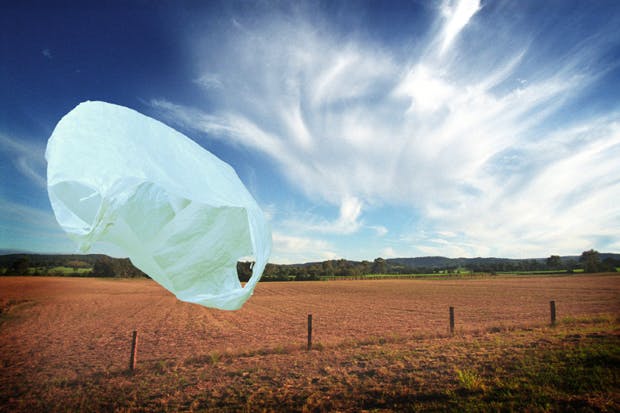It has taken years, but finally England has joined the rest of the United Kingdom and other countries around the world in declaring war on the plastic carrier bag. This week for the first time English supermarkets are being forbidden by law to give plastic bags away for free. From now on they will have to charge 5p for every one of them. It is the beginning of the end. The plastic bag is heading for oblivion. The most useful shopping tool of the last half-century will soon, I imagine, be extinct.
It seems only appropriate at this point to say how wonderful plastic bags have been. They are the most useful carriers ever invented — strong, light, capacious and absurdly cheap to produce. Life without them will never be so easy again. In future, anyone wanting to buy a few things from the supermarket on the way home from work will have to remember to take a reusable shopping bag out with him in the morning. Anyone stocking up with food at the weekend will have to set out with a supply of his own bags in the car. I already try to do this, but usually forget. Oh, how I will miss the plastic bag.
But the remarkable thing is that the end of the plastic bag, when it happens, will not have been an imposition from above but a fulfilment of the popular will. A consultation exercise carried out eight years ago found, for example, that 90 per cent of Londoners were in favour of banning plastic bags altogether. Ninety per cent of Londoners wanted to abolish one of the greatest conveniences of their everyday lives! Who can say that people are always selfish?
The popularity of the new measure against plastic bags, the docile acceptance of having to pay for something that always used to be free, is evidence of how responsive people can be to campaigns for the wider public good. The campaign against smoking has been successful, too, but smoking kills individuals, which is rather different. Plastic bags just threaten the world.
That threat, however, is impressive. The statistics are enough to alarm anyone. Hitherto in Britain, billions of plastic bags have been given to shoppers each year, and they have all got thrown away. About 60,000 tons of them have ended up in landfills, where they can take more than 400 years to decompose — a process that promotes climate change by releasing carbon dioxide into the atmosphere.
Throughout the world, between 500 and 1,000 billion plastic bags are thought to be consumed annually, more than a million a minute. And those that don’t reach landfill sites get blown about on the wind from the North Pole to the South, littering every continent and polluting every sea.
Those floating out at sea have a devastating effect on marine life. Turtles eat them, thinking they are jellyfish, and die in consequence. Altogether, more than 100,000 mammals, including whales and seals, and up to one million seabirds are thought to be killed each year from eating or getting tangled up in plastic. And like the poignant photograph of a dead child on a beach in Turkey that got the campaign to admit refugees to Britain going, it took a distressing image to spark the revolution against plastic bags.
It was the sight of some albatross chicks dying from eating plastic on a beach in Devon that eight years ago upset Rebecca Hosking, a BBC camerawoman, so much that she persuaded shopkeepers in her hometown of Modbury to give up plastic bags altogether, thus launching the campaign of which we are seeing the results today.
Discarded plastic bags may occasionally have their uses. I am told that in some parts of Africa there has developed a cottage industry in which people turn them into hats. But on the whole I have to say that even I am convinced that they are not a good thing. So I will try not to mourn them. I will stock up on sturdy canvas bags and try to remember to take them with me to the supermarket. Or maybe I should do the sensible thing and start getting my groceries delivered to my home instead.
Got something to add? Join the discussion and comment below.
Get 10 issues for just $10
Subscribe to The Spectator Australia today for the next 10 magazine issues, plus full online access, for just $10.













Comments
Don't miss out
Join the conversation with other Spectator Australia readers. Subscribe to leave a comment.
SUBSCRIBEAlready a subscriber? Log in